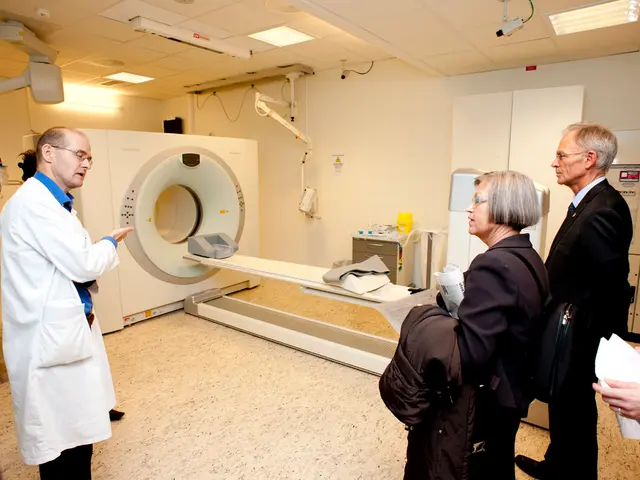Kept Brain-Dead Pregnant Woman's Ordeal: A Cruel Twist of Strict Abortion Laws
Medical practitioners in the U.S. maintain brain-dead expectant mothers on life support systems.
In a distressing turn of events, a pregnant woman named Adriana Smith, declared brain-dead in Georgia, has been kept on life support for an extended period. This prolonged life support is a direct consequence of Georgia's stringent abortion laws.
After a serious medical emergency, a pregnant woman in Georgia, according to her family, was deemed brain-dead. However, doctors are keeping the 30-year-old alive against the strict abortion laws of the state. The aim is to buy enough time for the delivery of the baby, which, considering the predicted due date, could be one of the longest artificially maintained pregnancies of this kind [1][2][3].
According to reports by multiple media outlets, Adriana Smith complained of severe headaches and was admitted to Northside Hospital in Atlanta in February 2025. She was treatmed medically and discharged. The following morning, her friend found her gasping for air. The doctors at Emory University Hospital diagnosed her with a brain hemorrhage.
Shortly after, Smith was declared brain-dead. At this point, she was in the ninth week of her pregnancy. The attending doctors reportedly informed her family that they could not cease life-sustaining measures due to Georgia's abortion laws, which forbid abortions once fetal heart activity is detected, usually around the sixth week of pregnancy [1][2].
Adriana Smith's mother, April Newkirk, spoke to local news station WXIA, stating her daughter is now in the 21st week of her pregnancy. Newkirk also reported that, according to the doctors, the fetus has fluid in the brain. "She is pregnant with my grandson," Newkirk said. "But he could be blind, he might not be able to walk and might not survive after birth," she added.
Monica Simpson, a Pro-Choice activist, commented, "Her family should have had the right to make decisions about their medical treatments." Instead, they have been subjected to 90 more days of traumatic experiences, high medical costs, and a lack of resolution or healing [1].
Neither Northside Hospital nor Emory Healthcare, the corporation responsible for Emory University Hospital, responded to AP's request for comment due to privacy concerns.
PoliticsWith these laws effectively making it impossible for pregnant women to make informed decisions about their health and future, the debate over reproductive rights has gained renewed attention. [1][3][4]
Key Insights:
- Duration of Life Support: Over three months.
- Legal Context: Georgia's "heartbeat law" prohibits abortion after fetal heart activity is detectable, which occurred in this case as the fetus was about nine weeks old when Smith was declared brain dead [1][2].
- Family's Situation: The family is distressed by the prolonged maintenance of life support against their wishes, describing it as "torture" [3].
- Medical Context: The maintenance of this pregnancy could be one of the longest artificially supported in US medical history [2].
- Political Implications: The case has added fuel to the ongoing debate about reproductive rights and women's health. [1][3][4]
[1] AP News - Adriana Smith's Family Fights for Her Right to Die: Georgia Abortion Laws Force Kept Brain-Dead Pregnant Woman to Live Against Her Will[2] CNN - Georgia's Tough Abortion Laws Force Brain-Dead Woman to Stay Pregnant[3] The Washington Post - Georgia's Abortion Law Forces Family to Keep Brain-Dead Woman on Life Support[4] NPR - The Longest Artificially Maintained Pregnancy: A Glimpse into Georgia's Abortion Laws
- The employment policy of hospitals in Georgia, like Northside Hospital and Emory University Hospital, must address scenarios where strict state community policies, such as the heartbeat law, conflict with a patient's or their family's wishes.
- In the field of science and medicine, discussions surrounding women's health and reproductive rights have become increasingly crucial, with policies and legislation playing a significant role.
- The health-and-wellness concerns of Adriana Smith, the brain-dead pregnant woman in Georgia, are compounded by additional issues, including mental-health effects on herself and her family, as well as potential consequences for her baby's health.
- A parenting course or resource within the Georgia healthcare system could help families like Adriana Smith's navigate difficult decisions regarding therapy-and-treatments options for complex situations, such as this one.
- As the political landscape evolves, understanding the impacts on policy-and-legislation, particularly in relation to those addressing women's health and reproductive rights, is essential for promoting informed discussion and advocacy.
- News outlets should provide comprehensive reporting on key stories, such as Adriana Smith's situation, to raise awareness about nutritional and mental-health considerations during women's health emergencies, as well as the broader implications for medicare and general-news audiences.







